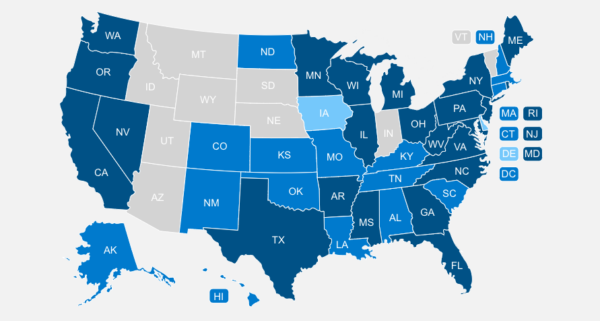
How to Start a Nonprofit in Hawaii: A Simple Step-by-Step Guide (2025)
August 26, 2025
How to Start a Nonprofit in Illinois: A Simple Step-by-Step Guide (With Checklists)
August 26, 2025How to Start a Nonprofit in Idaho: Step-by-Step Guide [With Legal Checklist]

Ready to make a lasting difference in your Idaho community?
Whether you’re passionate about education, healthcare, or environmental conservation, starting a nonprofit organization can transform your vision into reality. However, the process of establishing a nonprofit in Idaho involves several crucial steps and legal requirements that you need to navigate carefully.
Specifically, you’ll need to define your mission, assemble a board, file the right paperwork, and secure your tax-exempt status. While this might sound overwhelming, breaking it down into manageable steps makes the process much easier. In fact, many successful nonprofits have started their journey with proper guidance and support. With Labyrinth, Inc.’s fully managed nonprofit formation services, you’ll receive 1-on-1 guidance from Nonprofit Compliance Specialists with over 15 years of experience, ensuring every detail—from state incorporation through IRS approval—is handled correctly.
This comprehensive guide will walk you through each step of starting a nonprofit in Idaho, from planning your organization to completing all legal requirements. Let’s turn your mission into action!
Plan Your Idaho Nonprofit
Proper planning forms the foundation of a successful nonprofit organization in Idaho. Before diving into paperwork and legal requirements, let’s focus on essential groundwork that will set your organization up for success.
Define Your Mission and Purpose
Your nonprofit’s mission statement serves as your organization’s compass, guiding all future decisions and activities. A well-crafted mission statement should clearly communicate why your organization exists and whom it serves. Additionally, your mission statement will appear on federal and state documents, making it crucial to develop one that accurately represents your nonprofit’s purpose.
Currently, Idaho hosts more than 9,000 registered nonprofit organizations, ranging from healthcare providers to educational institutions. Understanding where your organization fits within this landscape helps shape a distinctive and impactful mission.
Research Similar Organizations
Before establishing your nonprofit, examine the existing nonprofit landscape in Idaho. The state’s nonprofit sector employs 73,676 people and generates more than $11 billion in annual revenue. Here’s a breakdown of major nonprofit categories in Idaho:
- Healthcare organizations: Generate $6.8 billion in revenue with 35,277 employees
- Educational institutions: Manage $870 million in revenue with 9,874 employees
- Human service organizations: Operate with $378 million in revenue and 7,780 employees
Understanding this landscape helps you identify gaps in services and potential collaboration opportunities. Professional guidance can help you navigate this research phase effectively, ensuring your organization fills a genuine community need while avoiding unnecessary duplication of services.
Create a Basic Budget
A thoughtful budget serves as a roadmap for your nonprofit’s financial sustainability. When developing your initial budget, focus on the essential costs related to formation and early operations:
- State filing fees: $30 for Articles of Incorporation
- IRS filing fees: $275 for Form 1023-EZ or $600 for Form 1023
- Registered agent service fees (if using a professional service)
- Initial board insurance and basic liability coverage
- Essential startup supplies and communications
You’ve outlined community needs and drafted a mission statement. Now what? Let’s tackle the state filings that move you forward.
When budgeting, remember that the Idaho Secretary of State (208-334-2301, their website) processes incorporation documents within 5-7 business days for standard filing. Expedited service is available for an additional fee if you need faster processing.
The Idaho Nonprofit Center offers valuable resources for financial planning, including sector-specific research and annual reports. These tools can help you develop realistic financial projections based on similar organizations in your field.
Remember that initial funding can be challenging for new nonprofits. Consider exploring various revenue streams, including grants, donations, and program fees, to create a sustainable financial foundation for your organization.
Choose Your Nonprofit Structure
Understanding the legal structure of your nonprofit organization sets the foundation for successful operations in Idaho. The state offers various nonprofit designations, each with specific requirements and responsibilities.
Types of Nonprofits in Idaho
The Internal Revenue Service recognizes 27 different nonprofit designations under section 501(c) of the tax code. Among these, the 501(c)(3) status remains the most sought-after classification. Professional guidance can help you determine the right nonprofit designation based on your organization’s goals. Labyrinth supports both 501(c)(3) and 501(c)(4) formations, ensuring you select the structure that best aligns with your mission and operational needs.
Idaho nonprofits encompass diverse categories, such as:
- Health organizations
- Social-service organizations
- Museums
- Religious organizations (churches, synagogues, temples, mosques)
- Fellowship groups
- Social clubs
- Civic organizations
Filing requirements vary based on your organization’s size and revenue. Nonprofits earning less than $50,000 annually must file Form 990N ‘e-Postcard.’ Organizations with revenue between $50,000 and $200,000 and assets under $500,000 can file Form 990-EZ. Larger organizations must submit the complete Form 990.
Board Member Requirements
Idaho requires every nonprofit corporation to have a minimum of three board directors, except for religious organizations which require only one director. While Idaho law sets this minimum, we recommend using three directors even if you qualify for the religious exemption, as the IRS expects three directors for 501(c)(3) organizations. Expert assistance can help you establish a compliant board structure, ensuring your organization meets both state and federal requirements while building an effective governance team.
Board members serve as fiduciaries, holding positions of trust and maintaining scrupulous good faith. Their primary responsibilities include:
- Managing charitable assets for community benefit
- Participating actively in governance
- Ensuring focus on the organization’s mission
- Maintaining financial oversight
- Reviewing and approving annual budgets
Moreover, board members must serve terms ranging from one to five years. The organization requires three essential officer positions:
- President
- Secretary
- Treasurer
Notably, except for the president and secretary positions, one person can hold multiple roles. All board committees must consist of at least two directors to ensure proper oversight and decision-making.
Board members possess specific rights, such as:
- Reasonable access to management
- Access to internal information
- Communication with principal advisors
- Review of financial statements
- Access to board meeting minutes
Each board member carries three fundamental duties:
- Duty of Care: Exercise prudent judgment in decision-making
- Duty of Loyalty: Maintain undivided allegiance to the organization
- Duty of Obedience: Keep the charity focused on its mission
The board should establish written policies addressing conflicts of interest. These policies should include provisions for:
- Disclosure of financial interests
- Withdrawal from discussions involving conflicts
- Abstention from voting on conflicted matters
Religious organizations operate under different rules. Churches and religious nonprofits need only one board director and face no officer requirements. Nevertheless, maintaining a robust governance structure remains beneficial for organizational effectiveness.
Register Your Nonprofit
Filing the right paperwork marks a crucial milestone in establishing your Idaho nonprofit. This phase involves three essential steps that require careful attention to detail and proper documentation.
File Articles of Incorporation
The Articles of Incorporation officially establish your nonprofit in Idaho. You must file these documents with the state before applying to the IRS for tax-exempt status. You can submit these documents through the Idaho Secretary of State’s office (208-334-2301, their website) either online or by mail. The filing fee is $30, regardless of the submission method. With Labyrinth’s state-specific drop-off service, your documents can be hand-delivered to the Idaho Secretary of State’s office for faster processing—a valuable advantage when time matters.
Your Articles of Incorporation must include:
- Organization name and purpose
- Physical address of registered agent in Idaho
- Names and addresses of initial board directors
- Incorporator details
- Mailing address for future reports
- Voting member status
- Asset distribution plan upon dissolution
For organizations seeking 501(c)(3) status, your Articles must contain specific IRS-required language. The purpose clause must limit your activities to exempt purposes under section 501(c)(3), and the dissolution clause must ensure that upon dissolution, your assets will be distributed to another 501(c)(3) organization or government entity for public purposes. Professional assistance can help ensure your Articles meet both state and federal requirements, eliminating the risk of rejection or delays. Labyrinth’s team drafts all incorporation documents to comply with both Idaho state law and IRS requirements, saving you hours of research and potential costly mistakes.
Get Your EIN Number
An Employer Identification Number (EIN) functions as your nonprofit’s federal tax identification number. You must obtain your EIN after incorporating but before opening bank accounts or applying for tax-exempt status. This nine-digit identifier proves essential for:
- Opening business bank accounts
- Filing tax returns
- Applying for tax-exempt status
- Establishing relationships with donors
You can obtain your EIN through various methods, including online via the IRS website (fastest option), phone, fax, or mail. The process is free of charge and typically takes about 15 minutes when completed online. After receiving your EIN, maintain proper documentation as you’ll need to notify the IRS of any changes in address, location, or responsible parties. Labyrinth includes EIN acquisition as part of their comprehensive formation service, handling this critical step alongside your other formation requirements through their secure SOC 2 Type II client portal.
Apply for 501(c)(3) Status
Securing 501(c)(3) status requires submitting either Form 1023 or Form 1023-EZ to the Internal Revenue Service. The choice between these forms depends on your organization’s size and nature. Understanding the differences between these forms is crucial for successful application. Labyrinth supports both 1023 and 1023-EZ filings, with their specialists determining the appropriate form based on your organization’s specific circumstances.
Form 1023-EZ, designed for smaller organizations with projected annual revenue under $50,000 and assets under $250,000, costs $275 and typically processes within 2-4 weeks. Alternatively, Form 1023, suited for larger organizations or those with more complex structures, requires a $600 fee and generally takes 3-9 months for processing.
The application process demands thorough documentation. Form 1023 applications often result in 50-100 pages of information, while Form 1023-EZ requires significantly less documentation. Key aspects include:
- Comprehensive description of your programs
- Detailed financial projections
- Organizational structure documentation
- Conflict of interest policies
- Compensation arrangements
Upon approval, the IRS issues a determination letter officially recognizing your tax-exempt status. This recognition makes donations to your organization tax-deductible and opens doors for grant funding opportunities. Labyrinth’s 100% IRS approval guarantee means you can proceed with confidence, knowing that if your 501(c)(3) application isn’t approved, you’ll receive a full refund. Their team also handles all IRS correspondence during the review process, ensuring timely and appropriate responses to any questions or requests for additional information.
Set Up Your Organization
Establishing solid organizational foundations ensures your Idaho nonprofit operates smoothly from day one. After completing the registration process, focus on creating internal structures that guide your organization’s operations.
Write Your Bylaws
Bylaws serve as your nonprofit’s operating manual, outlining governance procedures and organizational rules. Idaho law mandates every nonprofit to adopt bylaws. Professional guidance can help craft comprehensive bylaws that address crucial operational aspects while ensuring compliance with both state and federal requirements.
Your bylaws must cover these essential components:
- Voting member classifications and rights
- Director tenure and responsibilities
- Officer duties and selection process
- Meeting procedures and voting protocols
- Financial management guidelines
- Conflict resolution methods
- Amendment procedures
Although Idaho doesn’t require filing bylaws with the state, these documents remain crucial for several reasons:
- Legal Compliance: Bylaws ensure adherence to state regulations
- Operational Clarity: They provide clear answers to structural questions
- IRS Requirements: Bylaws submission is mandatory for 501(c)(3) status
- Organizational Guidance: They help directors steer the organization effectively
Labyrinth’s formation service includes professional drafting of your bylaws, ensuring they align with your Articles of Incorporation and meet all legal requirements. Their specialists customize bylaws to your specific organizational needs while incorporating best practices from their 15+ years of nonprofit leadership experience.
Hold First Board Meeting
The initial board meeting marks your nonprofit’s formal beginning. This organizational meeting must occur after incorporation and sets the stage for future operations. Expert guidance ensures proper documentation of this crucial meeting, which becomes part of your IRS application package.
First meeting agenda items should encompass:
- Attendance and Quorum Verification
- Record all present board members
- Confirm meeting meets quorum requirements
- Bylaw Adoption
- Present drafted bylaws
- Vote on formal adoption
- Document the resolution in meeting minutes
- Officer Appointments
- Elect president/chairperson
- Select treasurer
- Appoint secretary
- Define officer responsibilities
- Essential Authorizations
- Approve opening corporate bank accounts
- Designate check signers
- Authorize tax-exemption application
- Establish principal office location
- Initial Planning
- Create committees if needed
- Discuss immediate goals
- Plan future meeting schedule
Accordingly, maintain detailed minutes of this meeting as they serve multiple purposes:
- Legal documentation
- Historical record
- IRS filing requirements
- Operational reference
Subsequently, distribute meeting minutes to all board members and store them securely with other corporate records. These documents prove invaluable for future reference and compliance requirements. Through Labyrinth’s secure client portal, you can store all organizational documents, including meeting minutes, in one centralized location accessible to authorized board members.
For enhanced effectiveness, consider emailing bylaws to board members prior to the first meeting. This practice allows thorough review and speeds up the adoption process. Throughout the meeting, ensure proper documentation of all decisions through formal resolutions.
Remember that except for religious organizations, Idaho requires nonprofits to maintain at least three board members. Each director should understand their fiduciary responsibilities and commitment to advancing the organization’s mission.
Complete Legal Requirements
Meeting Idaho’s legal requirements ensures your nonprofit maintains good standing and operates within state guidelines. Let’s explore the essential steps for tax registration, licensing, and insurance coverage.
State Tax Registration
Upon receiving federal tax-exempt status, your nonprofit automatically qualifies for Idaho income tax exemption. The Idaho State Tax Commission (208-334-7660, their official website) recognizes federal 501(c)(3) determinations for state income tax purposes. Still, certain tax obligations remain. Most nonprofits must pay and collect sales tax unless specific exemptions apply.
Particular organizations qualify for sales tax exemptions:
* Food banks
* Soup kitchens
* Religious organizations
* Groups providing free clothing to those in need
To claim these exemptions, submit Form ST-101 (Sales Tax Resale or Exemption Certificate) to vendors. Professional guidance helps navigate complex tax requirements and ensures compliance. Labyrinth’s Nonprofit Compliance Specialists can advise on which tax exemptions apply to your specific organization and help you maintain proper documentation.
For organizations with retail sales, register for:
* Idaho seller’s permit
* Withholding account (if employing staff)
Nonprofits conducting occasional sales may obtain temporary permits instead of permanent ones. Additionally, gifts received by nonprofits, regardless of form (monetary, items, or services), remain exempt from sales and use tax.
Business Licenses
Unlike some states, Idaho doesn’t mandate a general statewide business license for nonprofits. Yet, local requirements vary significantly across cities and counties. Contact your local city clerk’s office to determine specific licensing needs for your organization’s activities.
Special permits might be necessary depending on your nonprofit’s activities. For instance, organizations planning to conduct:
* Bingo games
* Raffles
* Other charitable gaming activities
Must register with the Idaho State Lottery (208-947-9400, their website). Expert assistance ensures proper identification and acquisition of required permits. Labyrinth’s comprehensive formation service includes guidance on identifying and obtaining any special permits your organization might need based on its activities and location.
Insurance Needs
Protecting your nonprofit through appropriate insurance coverage remains essential for long-term sustainability. Since board members face potential litigation risks, even from frivolous lawsuits, securing directors and officers (D&O) liability insurance offers crucial protection.
Key insurance considerations include:
General Liability Insurance
- Protects against third-party claims
- Covers bodily injury and property damage
- Essential for organizations interacting with the public
Directors and Officers Insurance
- Safeguards board members and officers
- Covers management decisions
- Protects personal assets
Workers’ Compensation
- Required by law for organizations with employees
- Coverage varies by location
- Must comply with state-specific requirements
Professional Liability Coverage
- Protects against service-related claims
- Covers advice or assistance provided
- Essential for organizations offering professional services
Several insurance providers specialize in nonprofit coverage throughout Idaho. Consider factors like:
* Organization size
* Service types
* Number of employees
* Public interaction level
When selecting coverage, examine providers rated “A Excellent” by AM Best, ensuring reliable protection. Insurance costs often prove lower for nonprofits compared to traditional businesses, considering their charitable nature.
Remember that insurance needs evolve alongside your organization’s growth. Regular policy reviews ensure adequate protection as programs expand and services diversify. Labyrinth’s ongoing support includes reminders about compliance requirements, helping ensure your organization maintains proper insurance coverage as it grows.
Maintain Compliance
Once your nonprofit achieves operational status, maintaining compliance becomes an ongoing responsibility. Idaho requires annual reporting to keep your nonprofit in good standing with the state.
Annual Report Requirements
Every Idaho nonprofit must file an annual report with the Secretary of State by the last day of the anniversary month of incorporation. The filing fee is $10, and reports can be submitted online through the Idaho Secretary of State’s business forms website. Failure to file results in administrative dissolution after two consecutive missed filings.
Your annual report must include:
- Current registered agent information
- Principal office address
- Names and addresses of current directors
- Brief description of nonprofit activities
Additionally, depending on your organization’s revenue, you must file the appropriate IRS Form 990 series annually:
- Form 990-N for organizations with gross receipts under $50,000
- Form 990-EZ for organizations with gross receipts under $200,000 and assets under $500,000
- Form 990 for larger organizations
Charitable Registration
If your nonprofit plans to solicit donations from Idaho residents, you must register with the Idaho Attorney General’s office (208-334-2400) before beginning fundraising activities. This registration is separate from your tax-exempt status and requires:
- Initial registration fee of $25
- Annual renewal fee of $10
- Financial statements or Form 990 copies
Certain organizations are exempt from registration, including religious organizations and educational institutions. However, we recommend confirming your exemption status with the Attorney General’s office to ensure compliance.
Labyrinth’s annual compliance services help ensure you never miss critical filing deadlines, protecting your nonprofit’s good standing and ability to operate legally in Idaho.
Conclusion
Starting a nonprofit in Idaho requires careful attention to detail through each phase of establishment. Most importantly, proper planning and documentation serve as cornerstones for long-term success. Your organization needs solid foundations – from crafting a clear mission statement to securing appropriate insurance coverage.
The path might seem complex, but breaking it down into manageable steps makes the process achievable. Professional guidance can simplify your nonprofit journey and help avoid common pitfalls. With Labyrinth’s fully managed formation services, you receive end-to-end support from incorporation through IRS approval, backed by a 100% money-back guarantee on your 501(c)(3) status. Additionally, understanding state-specific requirements ensures your organization maintains good standing while serving Idaho communities.
Remember that success comes from thorough preparation and commitment to compliance. Your careful attention to legal requirements, board structure, and organizational policies will build a strong foundation for your nonprofit’s future. Through Labyrinth’s transparent pricing with no hidden fees, you’ll know exactly what to expect throughout the formation process. Above all, keep your mission at the heart of every decision as you work to make a lasting impact in your community.
With over 35 years of experience helping nonprofits stay compliant, Labyrinth combines expert service with modern technology to handle your nonprofit’s registrations and renewals, so you can focus on your mission. Their first-year fundraising registration is included in bundled services, providing additional value as you launch your organization. When you’re ready to begin, sign up online and track every step in real-time via your secure client portal, knowing that experienced professionals are managing every detail of your nonprofit formation.


![Your 501(c)(3) Approval Guaranteed{{ include_custom_fonts({"Museo Sans":["Bold","Bold Italic","Regular","Regular Italic"]}) }}](https://no-cache.hubspot.com/cta/default/560178/interactive-194101957210.png)
![Start Your Nonprofit with Confidence{{ include_custom_fonts({"Museo Sans":["Bold","Bold Italic","Regular","Regular Italic"]}) }}](https://no-cache.hubspot.com/cta/default/560178/interactive-194101957151.png)








